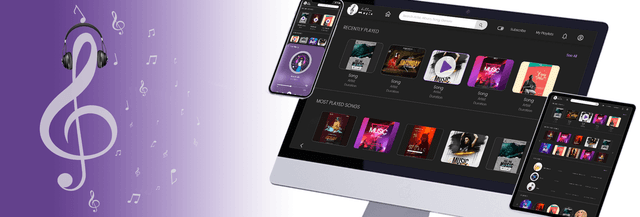
In the dynamic realm of finance, technology is revolutionizing the way businesses operate and interact with their customers. Banking-as-a-Service (BaaS) stands at the forefront of this innovation, empowering non-financial institutions to integrate financial services seamlessly into their offerings. This transformative model is not only disrupting the traditional banking landscape but also opening up a myriad of opportunities across various industries.
Before we delve into the Use Cases of BaaS, let;s understand the basic utility of BaaS in development…
Uses of BaaS in Mobile App Development
BaaS (Backend as a Service) is a cloud computing service that provides developers with a backend infrastructure for building and deploying mobile applications. Here are some of the uses of BaaS in mobile app development:
User Management: BaaS platforms typically offer built-in authentication services that support common authentication methods, such as email/password, social media logins (e.g., Google, Facebook, Twitter), and third-party identity providers (e.g., OAuth). This allows developers to implement secure authentication without having to build and manage their authentication systems.
Data Storage: BaaS provides cloud-based data storage solutions that allow developers to store and retrieve app data such as user profiles, images, videos, and audio files. This eliminates the need for developers to manage their own database and server infrastructure.
Push Notifications: BaaS provides push notification services that enable developers to send real-time notifications to users. This feature is essential for mobile applications that need to send alerts and updates to users even when the app is not active.
Analytics: BaaS provides analytics tools that enable developers to track user behavior and app performance. This data can be used to optimize the app’s user experience, improve app performance, and increase user engagement.
APIs and Integrations: BaaS provides APIs and integrations that allow developers to easily integrate third-party services such as social media, payment gateways, and messaging platforms into their mobile applications.
Database Management: BaaS provides database management features that allow developers to store, manage and retrieve data for web applications. This eliminates the need for developers to manage their own server infrastructure and database management system.
Security: BaaS provides security features such as data encryption, user authentication, and access control that help to protect user data and prevent unauthorized access.
File Storage: BaaS provides cloud-based file storage solutions that allow developers to store and retrieve files such as images, videos, and documents for web applications. This eliminates the need for developers to manage their own server infrastructure for file storage.
Overall, BaaS simplifies the development process for mobile applications by providing a backend infrastructure that handles essential features such as user management, data storage, and push notifications. This allows developers to focus on building the front-end of their mobile applications, saving time and resources.
Uses of BaaS in Internet of Things (IoT) applications

BaaS (Backend as a Service) can also be used in Internet of Things (IoT) applications to simplify the development process and provide a reliable backend infrastructure. Here are some of the uses of BaaS in IoT applications:
Device Management: BaaS provides device management features that allow developers to manage and authenticate IoT devices. It enables developers to implement features such as device registration, device data collection, and device status tracking.
Data Management: BaaS provides data management features that allow developers to store, manage and analyze data from IoT devices. This eliminates the need for developers to manage their own server infrastructure and database management system.
Scalability: BaaS provides scalable infrastructure that can handle large volumes of data and traffic for IoT applications. This ensures that the application can handle the growth in the number of devices and users over time.
Overall, BaaS simplifies the development process for IoT applications by providing a backend infrastructure that handles essential features such as device management, data management, and analytics. This allows developers to focus on building the front-end of their IoT applications, saving time and resources.
Use Cases / Domains for BaaS
1. Gaming
In the gaming industry, Backend-as-a-Service (BaaS) plays a crucial role in supporting various aspects of game development, deployment, and ongoing management. Here’s an expanded look at the gaming use case for BaaS:

- User Authentication and Profiles:
BaaS proves useful specifically for multiplayer games where players need to create accounts, log in securely, and maintain personalized profiles. - Leaderboards and Achievements:BaaS platforms often include features for creating and managing leaderboards and achievements. Game developers can easily integrate these components to enhance competition among players and encourage engagement.
- Real-time Multiplayer Functionality:
BaaS supports real-time features crucial for multiplayer games, including real-time data synchronization, communication channels, and matchmaking services. This ensures a smooth and immersive gaming experience for players interacting in real-time. - In-App Purchases and Monetization:
BaaS facilitates in-app purchases, allowing game developers to implement monetization strategies seamlessly. This includes managing virtual currencies, processing transactions, and handling receipts for purchased items. - Data Analytics and Player Insights:BaaS solutions typically offer analytics tools that help game developers gather insights into player behavior, preferences, and performance. This data is valuable for refining game mechanics, enhancing user experience, and making data-driven decisions.
- Content Delivery and Updates:
BaaS supports the delivery of game content, updates, and patches. Developers can efficiently manage and distribute new levels, features, and bug fixes without requiring players to download large files manually. - Security and Anti-Cheat Measures:
BaaS providers often implement robust security measures to protect games from unauthorized access and cheating. This includes secure user authentication, data encryption, and mechanisms to detect and prevent cheating in multiplayer games. - Scalability for Game Traffic:
Multiplayer games can experience varying levels of traffic, especially during peak hours or special events. BaaS platforms are designed to scale seamlessly, ensuring that the backend infrastructure can handle increased loads without compromising performance. - Community and Social Integration:
BaaS can facilitate social integration within games, enabling features such as friend lists, social sharing, and community forums. This helps build a sense of community among players.
Best BaaS Providers for Gaming:
- Firebase (Google Cloud Platform)
- PlayFab (Microsoft Azure)
- AWS Amplify (Amazon Web Services)
- Photon (PUN)
- Colyseus
When choosing a BaaS provider for game development, it’s essential to consider the specific requirements of your game, such as the type of multiplayer functionality, authentication methods, scalability needs, and any unique features your game may require. Each BaaS provider has its strengths and may be better suited for certain types of games or development workflows.
Check out our blog on MULTIPLAYER GAME SERVER WITH A COMPARISON OF COLYSEUS VS GAMELIFT VS PLAYFAB VS PHOTON)
3. Healthcare

- Patient Data Management:
BaaS can assist in managing patient data securely. This includes features for creating and updating patient profiles, storing medical histories, managing appointments, and ensuring compliance with data protection regulations. - Appointment Scheduling:
Healthcare applications can leverage BaaS for appointment scheduling functionalities. This involves managing appointment slots, sending reminders to patients, and facilitating communication between healthcare providers and patients. - Telemedicine and Remote Patient Monitoring:
BaaS can support telemedicine applications by providing the backend infrastructure for video consultations, secure messaging, and remote patient monitoring. This includes storing and analyzing data from connected health devices. - Electronic Health Records (EHR):
BaaS platforms can be used to build and manage electronic health records systems. This involves storing patient records, lab results, and treatment plans securely, with features for authorized access and updates. - User Authentication and Authorization:
BaaS simplifies the implementation of secure user authentication, ensuring that only authorized personnel have access to patient data. This is crucial for maintaining patient privacy and complying with healthcare regulations. - Data Interoperability:
BaaS can facilitate data interoperability by providing APIs that enable seamless communication between different healthcare systems. This is essential for sharing patient data across various applications and ensuring a comprehensive view of a patient’s health. - Medication Management:
BaaS can support features related to medication management, including prescription tracking, medication reminders, and integration with pharmacy systems. This helps improve medication adherence and patient outcomes. - Healthcare Analytics:
BaaS platforms may include analytics tools that allow healthcare providers to gather insights from patient data. This can aid in identifying trends, improving treatment plans, and enhancing overall healthcare delivery. - Integration with Healthcare Standards:
BaaS providers can support integration with healthcare standards such as HL7 (Health Level Seven) and FHIR (Fast Healthcare Interoperability Resources). This ensures compatibility with existing healthcare systems and promotes interoperability. - Compliance and Security:
BaaS platforms adhere to stringent security measures and compliance standards, such as HIPAA (Health Insurance Portability and Accountability Act). This is crucial for protecting sensitive patient information and ensuring the confidentiality and integrity of healthcare data. - Patient Engagement:
BaaS can support features that enhance patient engagement, such as secure messaging, educational content delivery, and interactive tools for patients to actively participate in their healthcare management. - Emergency Response Systems:
BaaS can be used to develop emergency response systems that facilitate quick communication between healthcare providers, emergency services, and patients during critical situations. - Population Health Management:
BaaS can assist in population health management by providing tools to analyze and manage the health of specific patient populations. This can include tracking and addressing public health issues.
3. Finance and Fintech:
Fintech apps can benefit from BaaS for secure user authentication, transaction processing, and compliance with financial regulations.
While User Authentication and Authorization, Secure Data Storage, Financial Analytics and Reporting are primary functionalities where BaaS can provide support, others are:
- Payment Processing:
For fintech applications involving blockchain or distributed ledger technology, BaaS can simplify the integration process. BaaS providers may offer APIs and services that enable seamless interaction with blockchain networks for activities like smart contract execution or cryptocurrency transactions. - Blockchain Integration:
BaaS platforms often integrate with payment gateways and financial services APIs, making it easier for fintech applications to handle payment processing. This includes facilitating online transactions, managing payment gateways, and ensuring compliance with payment industry standards. - Fraud Detection and Security:
BaaS platforms often include features for implementing fraud detection mechanisms. Developers can leverage these services to monitor transactions, identify suspicious activities, and enhance the overall security of financial applications. - Account Aggregation:
BaaS can assist in building applications that aggregate financial data from multiple sources. This can include integrating with APIs from banks and financial institutions to provide users with a consolidated view of their accounts, transactions, and financial health. - KYC (Know Your Customer) Compliance:
BaaS providers often offer features that support KYC compliance. This is essential for fintech applications that need to verify the identity of users, adhere to regulatory requirements, and prevent fraudulent activities. - Investment and Wealth Management::
Fintech applications involved in investment and wealth management can leverage BaaS for features such as portfolio tracking, investment recommendations, and performance analytics. BaaS facilitates the backend processes required for these functionalities. - Loan and Credit Services:
Fintech applications offering loan or credit services can utilize BaaS for managing user profiles, credit scoring, loan processing, and repayment tracking. BaaS simplifies the backend operations required for these financial services. - Budgeting and Personal Finance:
BaaS platforms can support the development of personal finance and budgeting applications. This includes features like expense tracking, budget management, and financial goal setting. - Regulatory Compliance:
BaaS providers may offer features and configurations to help fintech applications maintain compliance with financial regulations. This is crucial for applications operating in different regions with varying regulatory requirements.
4. Education:
BaaS can be employed in educational apps for managing user profiles, content delivery, and collaborative features among students and educators.
5. E-commerce:
E-commerce platforms can utilize BaaS for inventory management, order processing, and integrating payment gateways while ensuring scalability during peak shopping periods.
6. Social Networking:
Social media and networking apps can leverage BaaS for user authentication, content sharing, and real-time updates, creating a seamless and interactive user experience.
7. Travel and Hospitality:
Applications in the travel industry can use BaaS for booking management, user profiles, and integration with third-party services like maps and weather.
8. Real Estate:
Real estate applications can employ BaaS for property listings, user accounts, and communication channels between buyers, sellers, and agents.
9. Internet of Things (IoT):
BaaS is valuable for IoT applications, providing backend support for device management, data storage, and communication between connected devices.
10. Media and Entertainment:
BaaS can be utilized in media apps for content delivery, user authentication, and managing user preferences for personalized recommendations.
11. Logistics and Supply Chain:
Applications in logistics and supply chain management can use BaaS for tracking shipments, managing inventory, and optimizing routes.
12. HR and Recruitment:
BaaS can streamline HR and recruitment processes by managing candidate profiles, interview scheduling, and communication channels.
13. Food Delivery and Restaurant Services:
Apps in the food industry can benefit from BaaS for order management, user authentication, and integration with payment systems.
14. Government and Public Services:
Government applications can leverage BaaS for citizen engagement, data management, and communication between government agencies and the public.
These are just a few examples, and BaaS can be applied across various industries where efficient backend management is essential for the success of digital applications.
Looking to Hire BaaS Professionals?
AUTHOR
Narsing Maheshwari
Have a project in mind?
Let's Discuss!
Build stunning & premium web apps with our top-rated Development Team & Accomplish your Business Goals Lightning Fast.
Our Services
Featured Blogs

Top 7 Methods to Select the Best Features for Your MVP
28 February, 2024

A Music Streaming App: from the Designers’ Desk
20 February, 2024
Have a project in mind?
Let's Discuss!
Build stunning & premium web apps with our top-rated Development Team & Accomplish your Business Goals Lightning Fast.

